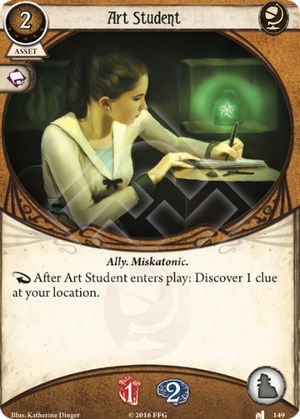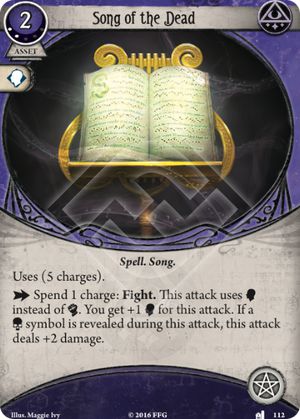
I don't normally leave reviews, but having the only review of Rex be negative just seemed wrong.
Rex is currently one of (if not the) strongest investigator in the game, and most of the community on places like Reddit, Facebook, and Discord agree (to the point where many people consider nerfing him in one way or another). While he definitely does have limitations, I'd like to go over exactly why Rex is top tier right now before I Delve Too Deep into his weaknesses.
To talk accurately about Rex, we first have to talk about Higher Education. Higher Education is without a doubt the most influential card in the game right now, as it drastically powers up the investigators who can take it (Rex and Daisy at time of writing). It provides both consistency and efficiency that's unparalleled in other classes, and the 5 card requirement is often negligible for Seekers who excel at card draw.
Higher Education is particularly important to Rex due to his passive ability, which is the main thing that takes him over the edge. Rex's passive allows him to save actions by picking up extra clues, and with no limiting factor he can potentially do this multiple times a turn. His naturally high of 4 and the boost from Higher Ed. means you can guarantee yourself a high probability of grabbing 2 clues over and over again. In 2-4 player games, Rex can hoover up all the clues almost single handed.
The seeker card pool is perfectly suited to helping Rex go on a rampage. Dr. Milan Christopher helps him keep the Higher Ed. engine running, Magnifying Glass naturally works well with Higher Ed. as well, and Preposterous Sketches + Search for the Truth (and the occasional effect) provide hand filling support right from level 0. Splashing for Burglary can keep your pockets full while still grabbing clues due to Rex's ability, and being flush with cash makes Rex almost immune to any based treachery effects. Not only that, but having almost unlimited boosting capabilities makes Rex's Curse almost a non-factor.
Ok, so Rex has strong synergy with strong cards, but you might be asking yourself: can't the same be said for other 'gators too? Well, not really.
The difference is that almost all other 'gators are naturally limited in how often they can use their abilities. "Skids" O'Toole, Daisy Walker, Jenny Barnes, Marie Lambeau, and Roland Banks all have abilities that work only once a turn. Wendy Adams and "Ashcan" Pete can use their powers at the cost of cards, which are a limited resource. Similarly, Agnes Baker is limited by both time (once per phase) and her sanity. The only other 'gators without limits are Jim Culver (who has a low impact ability you can't play around) and Zoey Samaras, who is limited by the existence of enemies in the first place.
Rex is really the only 'gator who has no limit on his ability. He can theoretically get six clues in one turn, saving a total of three actions. This kind of efficiency simply isn't possible with other 'gators. And Rex currently has the card support to make this insane action efficiency a reality with stunning consistency.
But Rex does have a weakness: solo mode. Not that he can't hold his own, in fact I think seekers have more than enough help dealing with enemies through cards like Mind over Matter, "I've got a plan!", and Disc of Itzamna (which Rex can Scavenging back). Rather, Rex is heavily weakened by solo mode because there are simply fewer clues to grab. Any 1 location is "immune" to his powers, and generally speaking he won't be holding onto a ton of clues at once for things like Search for the Truth.
Still, I hope I've been able to illustrate just why Rex is insane in 2+ player games. As long as he's got a buddy to guard him, Rex makes short work of any clue-based scenario (which is quite nearly all of them).




